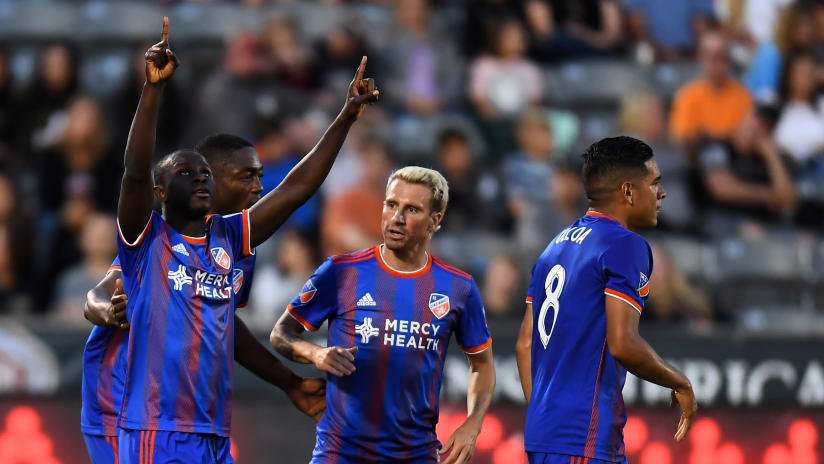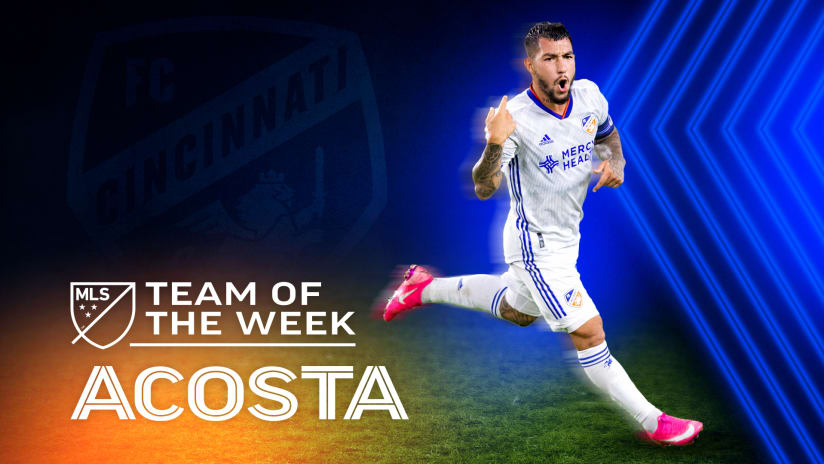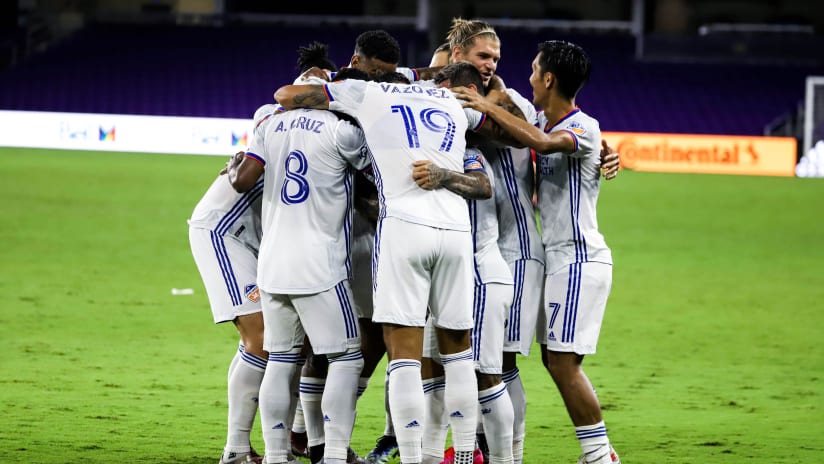When Kekuta Manneh scored Saturday night against the Colorado Rapids, he fell to his knees, dropped his arms and forehead to the grass and prayed.
It was a moment of appreciation for Manneh, but its significance went beyond the goal itself. The prayer was also for health.
“You could see when I scored, I went down to thank God for the opportunity and for good health during Ramadan,” he said. “It’s definitely rewarding.”
Manneh is Muslim, and like other members of FC Cincinnati’s squad and more than a billion Muslims around the world, he’s currently practicing Ramadan – a month that includes fasting during daylight, increased prayer and charity.
Fasting is one of the five Pillars of Islam and lasts from May 5-June 4 this year. (Times vary annually to coincide with the Islamic calendar.)
According to the Islamic Network Groups, “Ramadan is a month of intense spiritual rejuvenation with a heightened focus on devotion.” It’s considered the holiest month of the year.
“It’s very important to me because it’s my religion,” Manneh said. “It’s what I believe in and for a good cause. It’s my beliefs and I take it seriously. I’m a strong believer and that’s why I do it.”
For the past month, Manneh, assistant coach Pa-Modou Kah and Nazmi Albadawi, who’s currently on loan at North Carolina FC, have fasted.
It takes enormous discipline and requires waking up at 4:45 a.m. for an early meal and to hydrate before not being able to eat or drink again until roughly 14-16 hours later. But considering they’re world-class athletes (Kah played professionally on three continents for 20 years), it’s even harder to fast while still needing to maintain high performance levels.
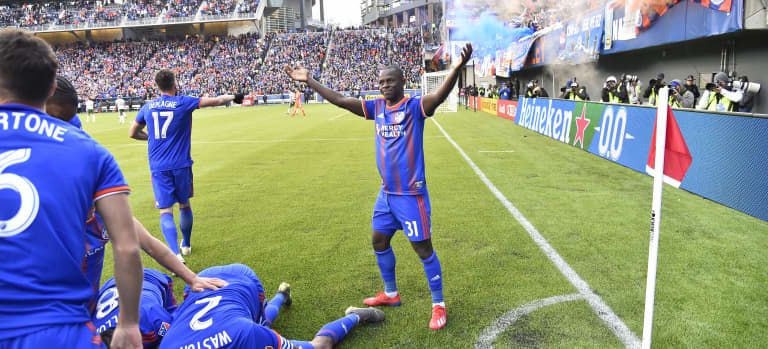
The difficulties of a professional athlete fasting
“The hardest part for me isn’t the food,” Albadawi said. “For me, when training is really difficult, it’s the (lack of) water, especially after training when you get home after a hot day and you can’t have water during the day.”
FC Cincinnati generally practice during the mornings. If they have a weight lifting session after training, players usually finish team exercises by 1 or 2 p.m. That typically allows players plenty of time to rest and rehydrate for the next day.
But that also means Albadawi and Manneh can’t replenish their bodies for at least another six hours until sunset. Going through that process could easily take its toll.
Sometimes players have to break their fast for a variety of reasons, ranging from a health concern to making sure they can play comfortably during a match. For example, when Albadawi made his MLS debut against the New York Red Bulls, he broke his fast.
“Last year it was very difficult for me to do it because it was a lot hotter and we were having three games a week during the U.S. Open Cup,” Albadawi said. “And we were on the Nippert turf every day. That also plays a factor.
“There were actually a few days when I couldn’t do it.”
It also didn’t help that the Palestine international was the only player at FCC fasting during Ramadan in 2018. Kah joined the club in September, while Manneh joined earlier this season.
Having people around helps.
When Manneh lived in The Gambia, where he was born, everyone fasted, so it was the cultural norm. The days were shorter and teams worked around it, too.
“I’m in a different environment, different culture, different country, so there are things you have to get used to and get yourself accustomed to,” Manneh said.
Getting accustomed means skipping water breaks during practice when teammates hydrate, or not eating during team meals before or after practice. The winger said his family hasn’t been fasting, so he’s even been accustomed to doing it individually in his own home.
“Even being home, I’m used to people eating when I can’t eat,” he said. “Before, it used to be a big deal. I used to go lock myself in my room. Now, it’s the environment and you can’t really change that, so I’m OK with seeing people eat.”
He said joining teammates for team meals – even if he’s not eating himself – fulfills social responsibilities and allows him to remain close with friends at the club.
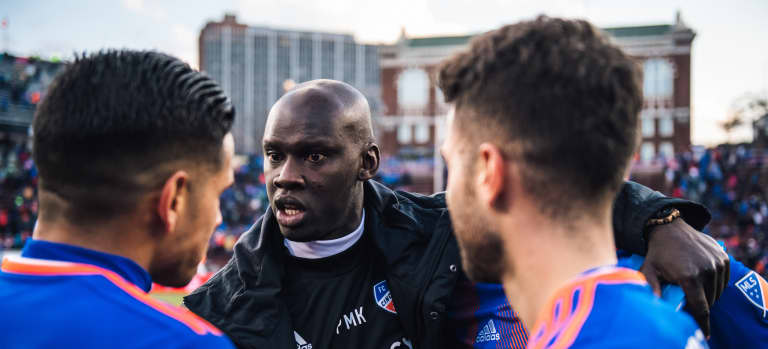
It’s slightly different for Kah as a coach, though.
“Obviously it will take a toll on your body when you’re a professional player,” he said. “But for me, it’s just a matter of why you’re doing it. People might not understand it, but that’s why people have their own religion.
“For me, the positive way I think about it, God allows us 11 months to eat, drink and everything. So, he asks us to make a choice. He says you have the choice for one month to feel what the people who have less than you feel.”
How to eat when fasting during Ramadan
“The two biggest things I’ve seen with players in the past and the problems that come up are the hydration piece and weight loss,” said Angela Bruzina, FC Cincinnati’s team dietician.
Generally, when Manneh and Albadawi wake up, they’ll say a morning prayer and eat a meal that provides them with the only food or drinks they consume until sundown.
As a result, it’s Bruzina’s job to help find the right foods that will provide energy but will have time to settle in the players’ stomachs before training.
Because fasting over a month can easily lead to weight loss, the foods Bruzina recommends to players are slightly altered from their non-Ramadan diets. These diets, which are based around a morning meal, a meal at sunset and then a third later in the night, are high-calorie, dense foods.
“Typically, what that looks like is a carbohydrate-heavy diet,” she said. “For breakfast, that might be one or two eggs, a couple pieces of toast, a side of oatmeal and fruit, a glass of juice or milk or chocolate milk.
“It’s just lots of carbohydrates because our bodies can store that for later use.”
The carbs help store water to help with hydration.
When the players break their fast at sunset, they eat dates and drink tea – which is traditional.
Although they haven’t consumed any fluids to rehydrate since the morning, Bruzina said she recommends they eat before they replenish with liquids so that they don’t get full. These drinks focus on electrolytes – like Propel – rather than water, which can rush through their body without being full absorbed.
“Instead of always having a leaner protein or leaner carbohydrates like pasta or rice, we try putting alfredo on pasta or adding healthy fats like avocado, nuts and seeds,” she said.
And by not drinking water, the players are consuming drinks (juice, milk or Propel) with higher levels of calories.
“That way they’re not only getting the fluids they need, but there are calories in the fluids and those absorb way better than just water alone,” Bruzina said.
These healthier steps can’t guarantee there isn’t weight loss – that weight often comes from muscles – but the diet can help players maintain similar levels they’d be at the other 11 months of the year.
Because there could also be muscle or weight loss, Bruzina works with Gary Walker, the Assistant Coach/Director of Sports Performance, and Head Athletic Trainer Aaron Powell. Together, they cater to each player’s needs to maximize health and athletic productivity.
“We just have to all work together to make sure the player is taken care of,” Bruzina said. “It’s definitely difficult for an elite athlete. I can’t say it’s going to be easy peasy for them. But this is something they feel really passionate about following, so it’s my job to make sure we do that as safely and healthy as possible from a nutrition standpoint.”
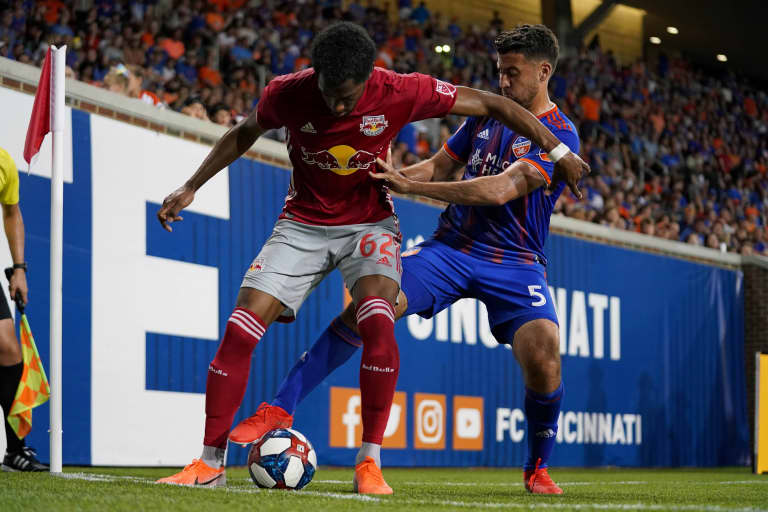
© Aaron Doster-USA TODAY Sports
Passing the time
During Ramadan, players wake up before 5 a.m. and go to sleep around midnight. In between then, they have three meals and a training session. So, what happens the rest of the time?
“I take an afternoon nap every day now during Ramadan,” Albadawi said. “It’s just because I’m tired, but it helps pass my time. Me and my wife have started seeing a few day-time movies.”
By going to movies later in the afternoon, that limits the waiting time before meals, the midfielder said.
“We ran out of movies, almost,” he added.
For Manneh, once he gets home from practice, he does his prayers and tries napping as well.
“I always go for a walk, then the gym sometimes,” he said. “By the time I’m done, it’s time to break the fast.”
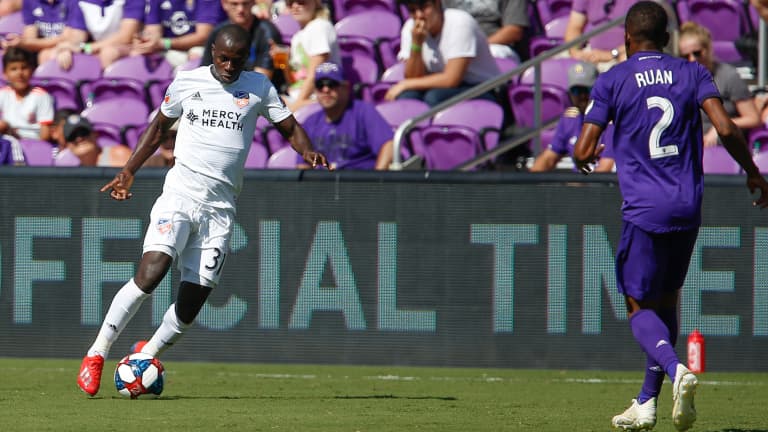
© Reinhold Matay-USA TODAY Sports
Post-Ramadan plans
Tuesday night marks Eid al-Fitr – the celebration ending Ramadan and breaking the fast. Beginning Wednesday, Manneh, Albadawi and Kah return to their diets similar to the other 11 months of the year.
Players can sleep in considerably later and return to hydrating throughout the day. Manneh, who sat with teammates during team meals, can eat once more.
But the drastic shift from fasting to not doesn’t mean habits instantly switch.
“When Ramadan’s over, it’s like working to get their appetite back,” Bruzina said.
She said that’s typically through small, frequent meals. That frequency helps a body reacclimate to eating during the day.
But beyond the physical health aspect, Albadawi said there are mental benefits as well, too.
“I’ve grown a lot in faith the last couple years and it’s something that’s been very important to me,” he said. “It makes me a better person and better human being. Having that sense of a higher being helps me be the man I want to be.”
Both FCC players mentioned this Ramadan has gone smoothly.
“It’s been great,” Manneh said. “Just the cause of it, the discipline of it, it’s been keeping me honest and I feel very refreshed following it and doing it.
“It’s very special to me, but I’m not in a hurry to get out of it. I’m enjoying it. It might not seem like it, but I’m enjoying it,” he said.
There’s one thing Manneh’s ready to have back, though: his daily routine of six cups of tea.
“I definitely miss my tea during the day, so I’m really looking forward to that when fasting ends,” he said.

